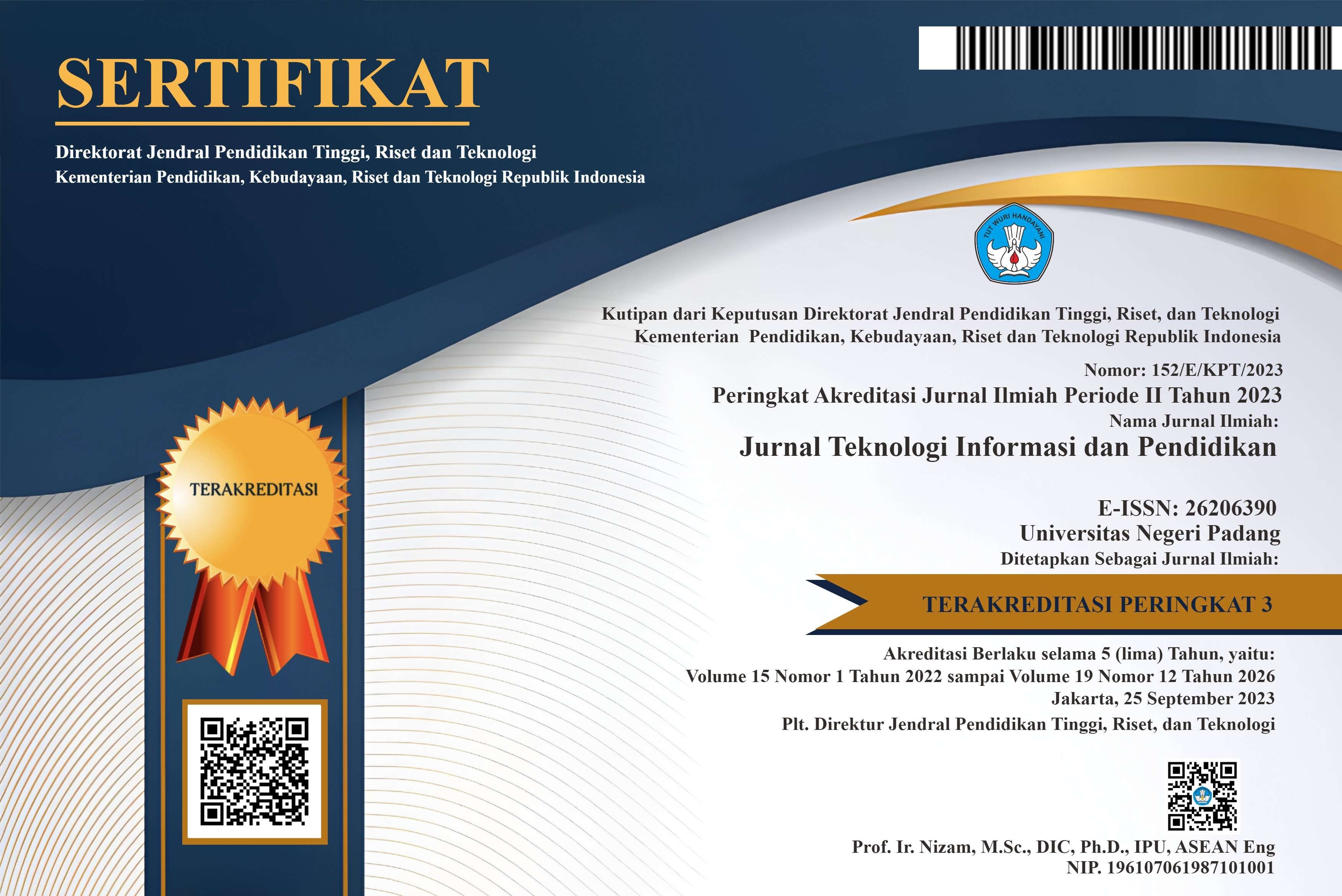Educational Game Development Based on Role Play Games for Students with Special Needs
DOI:
https://doi.org/10.24036/jtip.v14i2.445Keywords:
educational games, student with special needsAbstract
The study aims to develop an educational game that can support students with special needs to learn and be experienced in life. The selection of the type of Role Play Game is expected to attract these students to participate in the learning process. To create fun learning, the Role Play Game itself provides animations, interactions, and challenges. This study applied the Luther-Sutopo method for game developments. Using this method, the developments cover game interfaces and gameplay. The results highlight interfaces and gameplay enhance game performances. They offer these students minimal difficulties in working on tasks. Therefore, this interactive and motivating game may stimulate them to learn independently. In response to current special education challenges, this educational game development has answered the demand for providing relevant learning technology for students with special needs. The gameplay of this Role-Playing Game initiates the students to learn and achieve daily living skills namely decision-making and problem solving. As one of the basic priorities of democratic societies, the principle of equal education and life opportunities operates through the use of the educational game as a learning-teaching method. This educational game development based on Role-Playing Game itself may better serve students with special needs to have better education and better life opportunities.
References
Uzunboylu, Hüseyin, and Deniz Özcan. "Teaching methods used in special education: A content analysis study." International Journal of Cognitive Research in Science, Engineering and Education Vol. 7. No. 2. 2019.
Demirok, Mukaddes Sakalli, Serap Meral Karabacak, and Harun Aysever. "Fait Tendencies Regarding Disability Problems within the Families." Cypriot Journal of Educational Sciences Vol. 14. No. 2. pp. 303-312. 2019.
Kukey, Ebru, Habibe Gunes, and Zulfu Genc. "Experiences of Classroom Teachers on the Use of Hands-On Material and Educational Software in Math Education." World Journal on Educational Technology: Current Issues Vol. 11. No. 1. pp. 74-86. 2019.
Al-Shammari, Zaid. "The Benefits of Technology Use in Teaching Students with Special Needs." (2008).
Will, Madeleine C. "Educating children with learning problems: A shared responsibility." Exceptional children Vol. 52. No. 5. pp. 411-415. 1986.
Hakim, Mukhammad Luqman. "Multimedia Interaktif Bagi Siswa Berkebutuhan Khusus." Al-Aulad: Journal of Islamic Primary Education Vol. 3. No. 1, pp. 48-55. 2020.
Wu, Bian, et al. "An evaluation of using a game development framework in higher education." 2009 22nd Conference on Software Engineering Education and Training. IEEE, 2009.
Hanafi, Hafizul Fahri, et al. "Improving students’ motivation in learning ICT course with the use of a mobile augmented reality learning environment." IOP Conference Series: Materials Science and Engineering. Vol. 226. No. 1. IOP Publishing, 2017.
Binanto, Iwan. Multimedia digital-dasar teori dan pengembangannya. Penerbit Andi, 2010.
Sari, Retno Purwani, and Cece Sobarna. "Persuasive Strategy in Interactive Educational Games for Toddlers." International Conference on Business, Economic, Social Science and Humanities (ICOBEST 2018). Atlantis Press, 2018.
Munz, Ulrich, et al. "Motivation and learning progress through educational games." IEEE Transactions on Industrial Electronics Vol. 54. No. 6. pp. 3141-3144. 2007.
Liu, Yunkai, Mary Vagula, and Stephen Frezza. "Work in progress: Integrating game design and development into undergraduate biology education." 2012 Frontiers in Education Conference Proceedings. IEEE, 2012.
Jong, Bin-Shyan, et al. "Using game-based cooperative learning to improve learning motivation: A study of online game use in an operating systems course." IEEE Transactions on Education Vol. 56. No. 2, pp. 183-190. 2012.
Blackhurst, A. Edward. "Perspectives on applications of technology in the field of learning disabilities." Learning Disability Quarterly Vol. 28. No. 2, pp. 175-178. 2005.
Setiawan, Alexander, and Andreas Handojo. Indonesian culture learning application based on android. Diss. Petra Christian University, 2017.
Kristanto, Andi, and A. Mariono. "Development of education game media for xii multimedia class students in vocational school." Journal of Physics: Conference Series. Vol. 1387. No. 1. IOP Publishing, 2019.
Kartaltepe, Erhan J., and Shouhuai Xi. "Towards blocking outgoing malicious impostor emails." 2006 International Symposium on a World of Wireless, Mobile and Multimedia Networks (WoWMoM'06). IEEE, 2006.
Sutopo, Hadi. "Pengembangan evaluasi pembelajaran berbasis mulimedia dengan flash, php, dan mysql." Jurnal Informatika Vol. 10. No. 2. pp. 79-85. 2009.
Satwika, I. P., et al. "Novelty Luther-Sutopo method for game development." Journal of Physics: Conference Series. Vol. 1402. No. 6. IOP Publishing, 2019.
Sari, R.P., et al. “Strategi Persuasif pada Tuturan Cerita Anak Berbahasa Inggris: Kajian Stilistika Pragmatik.” Dissertation Manuscript, 2018.
Fullerton, T. “Game Design Workshop – A Playcentric Approach to Creating Innovative Games. 2nd Edition. Burlington: Elsevier, 2008.















.png)














